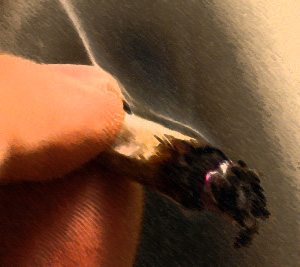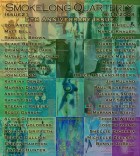You guest edited issue 19 of SmokeLong. As an editor, what sorts of things catch your eye, and what in this piece would pique your interest as an editor?
Like most readers, I like to be taken someplace new, but the newness isn’t strictly limited to place (otherwise we’d all be happily clucking through travel guides), it can be a space that’s psychologically or rhetorically unfamiliar. Berlin. A bad divorce. Irregular syntax. Even more important than the newness is the confidence with which the author navigates the landscape. You can make it so new that it’s downright strange, but do so with confidence.
For instance, next week I’m taking my wife to Belfast. One of my oldest friends is getting married and we’re going to his wedding at a church on Falls Road—ground zero for The Troubles. This is a place that doesn’t reveal itself to tourists, but with my friend as our guide we’ll have an experience that would be impossible to replicate on our own. That’s what good prose ought to be like: a guide who gives you a good time and delivers something unexpected and new.
But a guide is not enough: there needs to be tension. I just finished reading Matthew Eck’s The Farther Shore, which is about a soldier’s experience in Somalia during America’s intervention there. It’s short novel that counters gritty, realistic prose with surreal set pieces. Because I know the author was in the Army and served in Somalia, I’m constantly wondering what’s real and what’s manufactured. Authorial fallacy 101, right? Sure, but this desire to know propels the reader along. I understand the book is a novel and don’t have any difficulty keeping the author and the narrator distinct in my mind, but I probably wouldn’t have read the book if it wasn’t for the author’s experience as a soldier in Somalia and if I were to discover that he’d never even been to Africa I’d feel cheated because it would undermine the author’s authority.
Another example: this morning I went to the Chula Vista Nature Center. Sea turtles and sharks. Eagles and owls. All that shit. The center sits on a marsh at the edge of the San Diego Harbor. In 1916 it was the site of the Hercules Powder Company which harvested kelp, turned it into acetone, and used it to make gunpowder for the war effort. The foundations for the old buildings are still there so when you look out at the marsh land the eye is interrupted by broken down bunkers, railroad tracks that go nowhere, cement cenotaphs to man’s ingenuity when it comes to the efficacy of erasing human life—all in a federally protected ecosystem. That’s the kind if tension that I find arresting as a reader, writer, and editor.
In our correspondence, you mentioned that an earlier version of this was created for Esquire‘s Napkin Project. Tell us a little more about that.
In the Fall of 2006 I was one of 200 writers who received a solicitation from Esquire to write a short story on a cocktail napkin that they provided. I wasn’t writing much. I was gearing up to quit my job at an advertising agency in LA and move to San Diego and get married. I was also gathering steam for a novel I wanted to begin once I made the move. I certainly wasn’t writing short fiction.
Then my future wife’s uncle was killed and we went to the funeral down in Ensenada, which was easily the most intense thing I’ve experienced in recent memory. It’s hard to know what to say and what to leave out when the story already feels like a kind of trespass; but it’s been almost two years and I’m long past the point of being squeamish about the details. “Arturo” was murdered pretty much the way I describe in the story. He lived next to my wife’s grandfather and I’d met him several times. Once, we were walking back to the rancho on a brutally hot day. He was driving by in his pick-up truck and stopped to say hello, banda blasting from the stereo, a cold Tecate between his legs. I was parched and I greedily eyed the beer, wondering if he had any more in the cooler in the passenger seat. He smiled and drove off and when I got back to the rancho I discovered that “Arturo” had cleaned me out. The beer I’d coveted had been my own. When men in dirty jeans lowered his casket into the ground with frayed ropes and women tried to throw themselves on the box, I realized I didn’t know “Arturo” at all, not in the least, but as the deadline for the Napkin Project loomed, I realized I was incapable of writing about anything else.
I settled on the concept of using the napkin as a note to a bartender explaining who the shot of tequila was for and it pretty much wrote itself.
You also mentioned that the piece has gone through several revisions since then based on live readings you gave of it. Is that a typical part of your process, or something specific to this piece? We’d love to hear more about how performance impacts writing and vise versa.
Last year I was invited to read at a Dia de los Muertos celebration and I asked my wife how she felt about me reading it. It’s one thing to use a death in the family as a springboard for a piece of fiction, but quite another to incorporate that death into a performance. (Writers are such ghouls. How do normal people put up with us?) She was completely supportive, but I had my own hang-ups to work through.
Once again, life cleared the path for art. My wife and I got married in the Valle de Guadalupe, just a few hundred yards from where “Arturo” was killed. Many people on my wife’s side of the family didn’t want us to get married there but we stuck to our plans. (My family, by the way, is happily in the dark about any alleged narcotrafficante connections in the family.) The wedding was wonderful and “Arturo’s” mother thanked us again and again for bringing happiness back to the Valley.
So when it came time to read “Handful of Dirt” it no longer felt like appropriated material, but a chapter of a story that had come full circle. I realized that my memory of the event was unreliable; that the story had achieved primacy in my imagination. I was no longer capable of telling anyone what happened without drawing on the story.
As for the performative aspects of writing, you don’t need me to tell you that writing is always improved by the experience of reading it out loud. It’s usually better to discover how and why in the privacy of one’s own study than on a dark stage with a spotlight beaming down on you. I’m not an actor, but I’m a big believer in owning the work so that when that “this isn’t going well” feeling arrives, the sound of your own voice is a comfort to you.
What’s Vermin on the Mount up to these days?
On July 20 Jim Krusoe (Girl Factory) and Sean Carswell (Train Wreck Girl) are going to read from their new novels and we’ve got some other surprises in store. Sometime in the near future we’ll have a special reading in collaboration with Black Clock. I still have some t-shirts left over from our St. Patrick’s Day Kiss Me I’m Vermin reading. If anyone is interested, drop me a line…
One question we’ve been asking a lot of our writers this issue is how they deal with the ups and downs of writing, and with the changes in markets and trends. Do you find your writing changing with trends, evolving on its own path, some combination of the two?
When I was an undergraduate, the first word my English composition instructor wrote on the first essay I’d turned in was “Wow!” I remember feeling as if my body was in three distinct regions: the top of my head flew clean off, my face was flushed and stinging with pointless embarrassment and my heart was double-timing Hallelujah! Hallelujah! I was an awful high school student and I’d just gotten out of the Navy where I’d been told I was a fuck-up so many times I no longer questioned it. I was at the low end of the confidence/self-esteem/fully developed human being scale and that “Wow!” saved me. It also put me on the path to becoming an English major, which eventually led to the writing racket.
Fast forward a few years. I was headed toward my mentor’s office and stumbled into a full-on argument between two tenured English professors, the fallout of which divided the department into various factions. I realized for the first time that the English department wasn’t this happy fraternity of folks with a hard-on for literature with a capital-L, but a bunch of… people. I was naïve, sure, but that didn’t make it any less appalling.
Being a writer is waiting for a “Wow” that seldom comes. We are seasick sailors trying to cross the ocean while vomiting below deck. We are thugs who show up at the gang war with daffodils and candy apples. We are golfers whacking bowling balls across the fairway with balsa wood drivers. We are prostitutes who sell our tongues for pillow talk. We will never know the joy of a perfectly deployed Frisbee or wear out our dancing shoes or listen to a secret without considering betraying it. Disappointment (with ourselves, our effort, intelligence, and hardening hearts) is the name of the game. If you’re not writing for yourself, and for your own reasons, you’re volunteering to be a pawn in an epic game of Chutes and Ladders. We all play, and the outcome is everywhere in evidence, but we roll the die alone.



 The core workshop of SmokeLong Fitness is all in writing, so you can take part from anywhere at anytime. We are excited about creating a supportive, consistent and structured environment for flash writers to work on their craft in a community. We are thrilled and proud to say that our workshop participants have won, placed, or been listed in every major flash competition. Community works.
The core workshop of SmokeLong Fitness is all in writing, so you can take part from anywhere at anytime. We are excited about creating a supportive, consistent and structured environment for flash writers to work on their craft in a community. We are thrilled and proud to say that our workshop participants have won, placed, or been listed in every major flash competition. Community works.